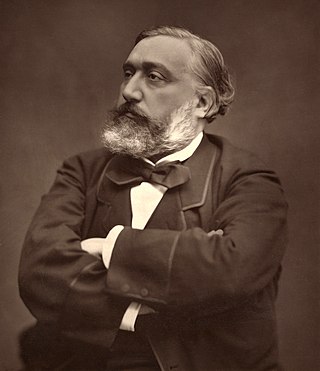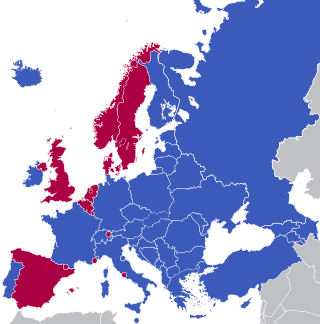
Jules Claude Gabriel Favre was a French statesman and lawyer. After the establishment of the Third Republic in September 1870, he became one of the leaders of the Opportunist Republicans in the National Assembly.

Marie Joseph Louis Adolphe Thiers was a French statesman and historian who served as President of France from 1871 to 1873. He was the second elected president and the first of the Third French Republic.

Marie Edme Patrice Maurice de MacMahon, marquis de MacMahon, duc de Magenta, was a French general and politician who served as President of France from 1873 to 1879. He was elevated to the dignity of Marshal of France by Napoleon III.

Orléanist was a 19th-century French political label originally used by those who supported a constitutional monarchy expressed by the House of Orléans. Due to the radical political changes that occurred during that century in France, three different phases of Orléanism can be identified:

Léon Gambetta was a French lawyer and republican politician who proclaimed the French Third Republic in 1870 and played a prominent role in its early government.

The French Second Republic, officially the French Republic, was the second republican government of France. It existed from 1848 until its dissolution in 1852.

The July Monarchy, officially the Kingdom of France, was a liberal constitutional monarchy in France under Louis Philippe I, starting on 26 July 1830, with the revolutionary victory after the July Revolution of 1830, and ending 23 February 1848, with the Revolution of 1848. It marks the end of the Bourbon Restoration (1814–1830). It began with the overthrow of the conservative government of Charles X, the last king of the main line House of Bourbon.

The Government of National Defense was the first government of the Third Republic of France from 4 September 1870 to 13 February 1871 during the Franco-Prussian War. It was formed after the proclamation of the Republic in Paris on 4 September, which in turn followed the surrender and capture of Emperor Napoleon III by the Prussians at the Battle of Sedan. The government, headed by General Louis Jules Trochu, was under Prussian siege in Paris. Breakouts were attempted twice, but met with disaster and rising dissatisfaction of the public. In late January the government, having further enraged the population of Paris by crushing a revolutionary uprising, surrendered to the Prussians. Two weeks later, it was replaced by the new government of Adolphe Thiers, which soon passed a variety of financial laws in an attempt to pay reparations and thus oblige the Prussians to leave France, leading to the outbreak of revolutions in French cities, and the ultimate creation of the Paris Commune.

The 16 May 1877 crisis was a constitutional crisis in the French Third Republic concerning the distribution of power between the president and the legislature. When the royalist president Patrice MacMahon dismissed the Moderate Republican prime minister Jules Simon, the parliament on 16 May 1877 refused to support the new government and was dissolved by the president. New elections resulted in the royalists increasing their seat totals, but nonetheless resulted in a majority for the Republicans. Thus, the interpretation of the 1875 Constitution as a parliamentary system prevailed over a presidential system. The crisis ultimately sealed the defeat of the royalist movement, and was instrumental in creating the conditions for the longevity of the Third Republic.

Bernard Edme Victor Etienne Lefranc, French lawyer and politician, moderate republican, was under the French Third Republic Minister of Agriculture and Trade, then Interior Minister.

The Treaty of Versailles of 1871 ended the Franco-Prussian War and was signed by Adolphe Thiers of the Third French Republic and Otto von Bismarck of the newly formed German Empire on 26 February 1871. A preliminary treaty, it was used to solidify the initial armistice of 28 January between the powers. It was ratified by the Treaty of Frankfurt on 10 May of the same year which confirmed the supremacy of the German Empire, replacing France as the dominant military power on the European continent.

The Constitutional Laws of 1875 were the laws passed in France by the National Assembly between February and July 1875 which established the Third French Republic.
Events from the year 1871 in France.

Monarchism in France is the advocacy of restoring the monarchy in France, which was abolished after the 1870 defeat by Prussia, arguably before that in 1848 with the establishment of the French Second Republic. The French monarchist movements are roughly divided today in three groups:
- The Legitimists for the royal House of Bourbon,
- the Orléanists for the cadet branch of the House of Orléans, and
- the Bonapartists for the imperial House of Bonaparte

The Armistice of Versailles that came into effect on 28 January 1871 brought to an end the active phase of the Franco-Prussian War. The signatories were Jules Favre, foreign minister in the provisional Government of National Defence, for the French and Otto von Bismarck, chancellor of the newly established German Empire, for Prussia and her allies. The suspension of hostilities initially lasted until 19 February, when it was extended through 26 February, when a preliminary peace treaty was signed, also at Versailles. The definitive Treaty of Frankfurt was signed on 10 May. Although technically an armistice, the military position of France at the time and the terms were such that it was de facto a conditional surrender by the vanquished to the victors.

Jean-Marie Allenou was a French ironmaster and conservative politician. He was deputy of Côtes-du-Nord, in Brittany, from 1871 to 1876, then Senator of Côtes-du-Nord from 1876 until his death in 1880.

The First cabinet of Jules Dufaure was the 54th cabinet of France and the second of the Third Republic, seating from 19 February 1871 to 18 May 1873, headed by Jules Dufaure as Vice-President of the Council of Ministers and Minister of Justice, under the presidency of Adolphe Thiers.
The Second Cabinet of Jules Dufaure is the 55th cabinet of France and the third of the Third Republic, seating from 18 May 1873 to 25 May 1873, headed by Jules Dufaure as Vice-President of the Council of Ministers and Minister of Justice, under the presidency of Adolphe Thiers.
The moral order was a coalition of the right that formed after the successive falls of Napoleon III and the provisional republican government. It is also the name of the policy advocated by the government of Albert de Broglie under the presidency of Marshal Patrice de Mac Mahon starting from 27 May 1873.

The proclamation of the French Republic on September 4, 1870, announced to the French people that the Republic was being reestablished, thereby founding the Third Republic, and causing the downfall of Emperor Napoleon III and the fall of the Second Empire. This event represents the fourth French Revolution, following those of 1789, 1830, and 1848.
















